
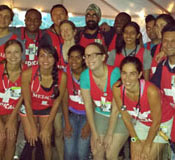
Emory at the Peachtree Road Race |
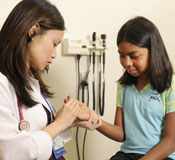
New pediatric center |

Driving innovation in new drugs |
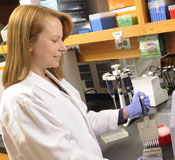 New subsidy for genomics testing |
Nursing school launches Doctor of Nursing Practice degree
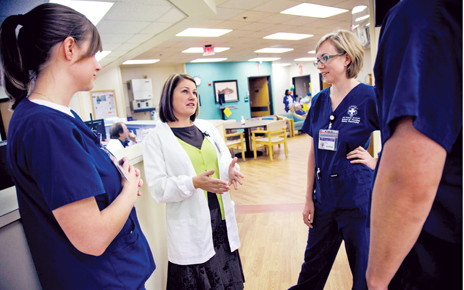 |
| Carolyn Clevenger (center) is one of several nursing faculty members with a DNP degree. |
The Nell Hodgson Woodruff School of Nursing will soon be accepting applications for its new Doctor of Nursing Practice (DNP) degree program for fall 2014. The program targets registered nurses seeking a terminal degree in nursing practice as an alternative to a research-intensive PhD program.
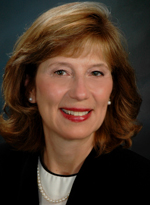 |
|
| Melissa Faulkner |
"The DNP will be practice-focused and will prepare clinicians for leadership roles in health care," says Melissa Faulkner, associate dean for educational innovation. "This program caters to students who want to advance their education without disrupting their careers."
DNP students will immerse themselves in a rigorous advanced practice curriculum, leadership development, residency hours, and a capstone project in a focused area of inquiry. Courses will be taught online and on-site in classes that will take place over three weekends each semester.
The DNP program offers two specialty tracks—health systems leadership and population health. Registered nurses with baccalaureate and master's degrees are eligible for the program. Nurses with MSN degrees can complete the DNP program in two years, while BSN-prepared nurses must complete four additional semesters of study in an advanced practice specialty.
By launching the DNP degree program, the nursing school is helping meet the demands of an increasingly complex health care environment. In recent years, the Institute of Medicine, Joint Commission, Robert Wood Johnson Foundation, and other authorities have called for a reconceptualization of education programs that prepare today's health professionals. Nationwide, DNP curricula emphasize education in evidence-based practice, quality improvement, and systems leadership, among other key areas. To date, the Commission on Collegiate Nursing Education has accredited 116 DNP programs.
For more information, contact the Office of Enrollment and Student Affairs at 404-727-7980 or visit www.nursing.emory.edu/dnp.—Pam Auchmutey
Emory at the Peachtree Road Race
 |
| This year's 21 emergency department interns at the Peachtree Road Race |
For more than 30 years, Emory emergency medicine faculty and interns (first-year residents) have staffed the Peachtree Road Race. For new interns, working in the medical tents by the finish line gives them a crash course on the harmful effects of the blistering heat that usually marks July 4th.
This year presented a new challenge though. In the wake of the bombing of the Boston race, organizers and the Atlanta Police Department wanted to make sure the race remained safe for runners, volunteers, and spectators.
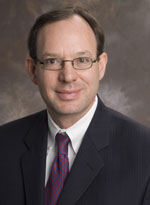 |
|
| Philip Shayne |
"I spent a lot of time worrying about how we were going to get all of us there with increased security," says Philip Shayne, an emergency medicine physician who is the Emory point person for the race. "But in the end, everything worked smoothly, and we almost didn't notice the increased security."
The cooler-than-normal temperatures helped keep a lot of heat-related illness at bay. "Usually the interns learn everything about what they need to learn about heat illnesses—cramps to prickly heat to heat stroke—for the rest of their careers in one day," Shayne says.
In past years, the faculty and residents usually treat a couple of hundred runners for heat-related illness and cardiac events and send 10 to 15 people to Atlanta emergency departments. This year only two were sent.
"I've been doing this since 1996, and this is by far the easiest race we've had," says Shayne. "The race is a huge enterprise. We took care of 120 people out of 60,000 runners, and obviously this year we saw the example in Boston where the medical response was instantaneous and incredible, and we felt pressure to be ready at that level."—Kay Torrance
New center will strengthen Emory's missions through partnership with Children's
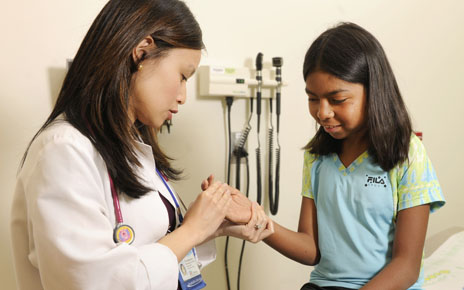 |
|
| Emory pediatric rheumatologist Sheila Angeles-Han with patient |
After several years of planning, Emory and Children's Healthcare of Atlanta have created the joint Pediatric Center, with the goal of integrating missions of the two institutions to provide the highest quality and most advanced care, strengthen pediatric research, and attract top-tier physicians, researchers, and students.
Key elements of the center include the following:
Emory pediatrics faculty are now leased to Children's for their clinical work (as of July 1), and their appointments as School of Medicine faculty remain the same. Nurses, medical technicians, and clinical support staff transitioned to Children's employment earlier this year.
Children's Healthcare will manage the center's clinical practice, formerly known as the Emory-Children's Center and now called Children's Specialty Services at Emory.
The Emory Children’s Center (ECC) building, which includes both clinical and research space, is still Emory owned, with Children's leasing and managing clinical space on the lower floor. Emory will manage all aspects of pediatric research in the new joint entity.
Emory infectious disease specialist Paul Spearman will continue to direct the highly successful and expanding Emory-Children's Pediatric Research Center. In addition to upper floors of the ECC building, many of these research programs will be conducted in the new Health Sciences Research Building, which connects to the ECC building both symbolically and physically via the two-story Brumley Bridge.
Moving new drug therapies beyond the "valley of death"
 |
Emory has launched a not-for-profit drug development company to help move new drug candidates through the arduous early phases of development and into clinical trials. The company, Drug Innovation Ventures at Emory (DRIVE), is separate from but wholly owned and controlled by Emory.
DRIVE will provide the financial, project management, and regulatory experience to develop and move Emory's drug candidates through preclinical testing—a stage of drug development often called the "valley of death"—and into proof-of-concept clinical trials. DRIVE will function as the business partner of the Emory Institute for Drug Discovery (EIDD), which was founded in 2009 by Dennis Liotta (chemistry) to foster development of new drugs. EIDD has a drug development team, equipment, and laboratory space to conduct preclinical activities of drug discovery.
 |
|
| DRIVE CEO George Painter, COO David Perryman, and Abel de la Rosa, chief science officer |
DRIVE's CEO and director is George Painter, who has more than 20 years of experience in drug research and development. Painter was a founder of Triangle Pharmaceuticals, which focused on therapies for HIV and hepatitis B and was sold to Gilead Sciences in 2003 for $550 million.
"The critical assets and expertise available to DRIVE should place Emory in a strong position to form research and development alliances with pharmaceutical companies, venture capitalists, and corporate venture groups," Painter says. "Through a shared risk model, DRIVE can offer substantial advantages to companies seeking to move their technology forward without the traditional costs of starting a new biotech enterprise."
DRIVE will finance its initial efforts with $10 million from monetization of royalties associated with the Emory-invented HIV drug Emtriva ("Em" refers to Emory) and additional funding from governmental agencies, partner institutions, and philanthropic and investment groups. The new enterprise will invest Emory's share of financial gains from technology transfer into research, education, and patient care.
DRIVE is the first initiative to be established within Emory Innovations, Inc., a newly created 501(c)(3) corporation that will serve as the home for innovative new enterprises, with the mission of supporting and enhancing the goals of Emory University.
"Smart Subsidy" reduces cost of genomics services
 |
The Winship Cancer Institute and the School of Medicine have launched a "Smart Subsidy" cost-reduction initiative for researchers who use the Emory Integrated Genomics Core (EIGC).
The subsidy is aimed at supporting researchers' use of genomics technologies at a time of financial challenges arising from federal sequestration. The EIGC provides services allowing scientists to conduct deep sequencing, interrogate gene expression and methylation patterns in a tissue sample, or search for mutations in an individual's DNA or in a tumor. Such technologies have become bread-and-butter laboratory commodities.
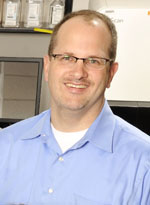 |
|
| Michael Zwick |
The subsidy will range between 5% and 15% for projects processed by the EIGC only. To encourage increased volume for improved efficiency, large projects will receive a higher percent subsidy.
"This subsidy, combined with our ongoing efforts to increase efficiency and cut costs, enables us to provide tremendous value to Emory researchers," says Michael Zwick (human genetics), scientific director of EIGC.
The EIGC, located on the seventh floor of the Woodruff Memorial Research Building, is a full-service genomics core, providing sequencing and genotyping services in a research and CLIA setting as well as computational services needed for analysis.
The EIGC also is launching a custom Emory Galaxy server that will provide a computational infrastructure for analyzing genome-wide datasets. EIGC operates and maintains a local installation of the Galaxy bioinformatics analysis platform for use by researchers. The Emory Galaxy cluster consists of local processing power as well as access to the larger Emory High Performance Computing Cluster.
"Generating vast quantities of data has become the relatively easy part of our job. Making sense of the data is the key challenge. Our new bioinformatics services and the launching of the Galaxy server will aid Emory researchers in this task," Zwick says. "Many faculty tell me that they need a bioinformatics expert to aid them in analyzing their data but do not want to hire a full-time person to do this work. We can provide technical experts for specific projects and thus provide value to researchers at a competitive cost," Zwick says.—Quinn Eastman
National and personal recognition are equally meaningful
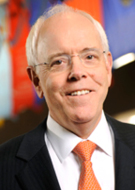 |
|
| Wright Caughman |
Emory’s health system has been repeatedly recognized for its excellence. Earlier this month, when Atlanta magazine issued its annual “Top Doctors” issue, nearly half of all physicians recognized were Emory doctors. Also this month, U.S. News & World Report issued its 2013-2014 Best Hospitals rankings, and Emory again led the pack, with Emory University Hospital named not only the best hospital in Atlanta, but also the best in the state. Both Emory University Hospital Midtown (EUHM) and Saint Joseph’s Hospital (SJH) were also ranked highly. EUHM ranked third in metro Atlanta and fourth in Georgia, while SJH came in fifth in the city and 12th statewide.
I'm grateful—but not surprised—to see the talent and hard work of our patient care teams recognized by these outstanding publications. I say I'm not surprised not out of hubris, but rather from a deep-seated confidence in the people of Emory Healthcare (EHC) and the Woodruff Health Sciences Center (WHSC). Thanks to you, local, regional, and national recognition has become the norm for our health system, which has in recent years been on a truly outstanding trajectory in quality, innovation, and patient satisfaction.
As important as these national achievements are, we received an equally meaningful but much more personal recognition earlier this month in the Atlanta Journal Constitution, when the family of a transplant patient devoted nearly a full column of the obituary page to thanking the doctors, nurses, and administrative staff who had cared for their loved one. The family acknowledged our team's excellence and expertise, along with their loving care and compassion, in a series of heartfelt notices that were truly touching and every bit as rewarding as any national ranking or award.
Congratulations to all of you on a fantastic month. All of this recognition just confirms what all of us in WHSC and EHC leadership already know: our people are among the finest health professionals in the world.
Please share your thoughts and suggestions with me at evphafeedback@emory.edu.
 |
Nursing school and VA to train nurses for veteran care
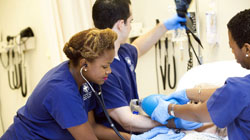 |
The nursing school and the Atlanta VA Medical Center (VAMC) received a $4 million grant from the U.S. Department of Veterans Affairs to train nurses for the specialized field of veteran health care. The grant will fund 10 additional faculty positions at the nursing school and increase the undergraduate class by 100 students over a five-year period. Students admitted during this partnership will be part of a two-year cohort focused on veteran care and will participate in clinical rotations at the Atlanta VAMC.
The nursing shortage is expected to grow to 1 million registered nurses by 2025, and the VA—the largest employer of nurses in the United States—is launching academic partnerships to recruit more nurses to veteran health care. Emory is one of six nursing schools nationwide selected for this partnership with the VA. Read more.
New contract with Grady is signed
The medical school and Grady Hospital reached a new Affiliation and Services Agreement, which became effective June 1. The new agreement will be in effect for five years and replaces the previous agreement with the Fulton-DeKalb Hospital Authority that was signed in 1984. Morehouse School of Medicine also signed a separate agreement with Grady. The partnership between Emory and Grady is more than 100 years old. Some 539 Emory medical faculty (235 full-time equivalent) and 362 Emory residents and fellows work at Grady.
Get answers to your cancer questions
Emory Healthcare and Winship Cancer Institute have developed "Whiteboard," an online portal for people to post questions about cancer and get an answer back from Winship cancer experts. Questions can be submitted related to any cancer topic or type and typically are answered within a day or two.
Appointments
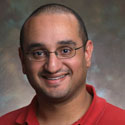 |
|
| Hany Atallah |
Hany Atallah was appointed chief of emergency medicine, Grady Health System, and medical director of the Emergency Care Center at Grady.
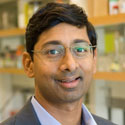 |
|
| Ravi Bellamkonda |
Ravi Bellamkonda was named chair of the Wallace Coulter Department of Biomedical Engineering at Georgia Tech and Emory.
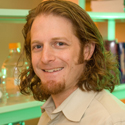 |
|
| Michael Davis |
Michael Davis was named director of the Center for Cardiovascular Biology in the Emory- Children's Pediatric Research Center.
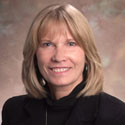 |
|
| Monica Farley |
Monica Farley (medicine) was appointed interim director of the Division of Infectious Diseases.
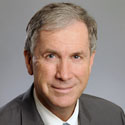 |
|
| David Stephens |
David Stephens (medicine), vice president for research in the Woodruff Health Sciences Center and director of the Division of Infectious Diseases in the medical school, was appointed interim chair of the medical school's Department of Medicine. Read his recent article, "The Cost and Value of Research," in Emory's Academic Exchange.
Honors
The following health sciences faculty and staff recently received awards: View details.
• Roxann Arnold
• Robert Gaynes
• Debra Houry
• Kate Moore
• Christine Nell-Dybdahl
• David Weiss
• Judith Wold
• Mary Zellinger
Events
Oct. 5: Winship Win the Fight 5K. More info.
Oct. 30: 2013 EHC Quality Conference, 7:30 a.m. - 12 p.m., Cox Hall, 3rd floor ballroom.
